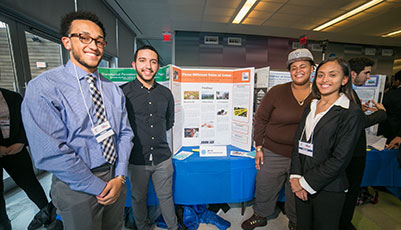
Scores of John Jay freshmen and transfer students stood proudly alongside poster presentations and other research efforts in the new building cafeteria, showing off their projects as part of the annual FYE (First Year Experience) Student Showcase that took place at the end of the fall semester.
“It really is amazing that first-year students are doing such original research,” said Kate Szur, Senior Director of Student Academic Success Programs. Entering freshmen at John Jay, who can choose from dozens of Learning Communities or First-Year Seminars, presented their research at the showcase.
Transfer students also had a prominent place among the displays, joined this year by students from the APPLE Corps (Academic Preparation Program for Law Enforcement); Early Start (for pre-freshmen); Adelante! (academic success program for Latina/o students); SEEK (Search for Education, Elevation and Knowledge); OSS (Opportunity for Student Success); ACE (Accelerate, Complete, Engage), and Justice First-Year Seminars.
To view photos of the event, click here.
The First-Year Seminars are part of John Jay’s General Education curriculum. The students in each Learning Community are taught by two or more professors from different disciplines. In many cases, students work together as teams on research and other presentations, grouped either by their own choice or at the suggestion of their professors.
The presentations — 127 poster displays and 15 digital or multimedia presentations — covered a broad array of topics ranging from gender issues to police practices, from immigration to education issues affecting college students.
One quartet of students — Melanie Mirano, Kristain Sukhnandan, Kayla Sanes and Claudia Michalak — from Professor Jason Frydman’s Psychology 141 class addressed the question of whether handwriting or electronic note-taking is more effective for students. “I was surprised with the findings,” said Sanes, a Forensic Psychology major, who noted that students were more than 50 percent better at retaining information when their notes were kept electronically rather than handwritten.
Angelica Klivan, Iris LaTorre, Carmen Rosa and Cristian Yepes created a practical experiment in the gymnasium for their project “Mathematics Improves Basketball.” Three basketball players took a succession of foul shots using several arm angles and positions, as the freshman researchers recorded their accuracy. “It makes it easier to do math if you can relate it to something you’re interested in,” said LaTorre, a Political Science major.
A team of students in the APPLE Corps program got an early introduction to field research for their project “Three Different Tales of Crime, Three Neighborhoods, One Borough.” Under the guidance of Professor Ric Curtis of the Anthropology Department, joined by Professors Yolanda Martin of Borough of Manhattan Community College, Camila Gelpi-Acosta of LaGuardia Community College and Crystal Rodriguez of Bronx Community College, the six students fanned out to the Brownsville, Sunset Park and Greenpoint sections of Brooklyn to knock on doors, conduct interviews and administer surveys.
“I never thought we’d be doing hands-on research as freshmen, going out and talking to people in the field,” said Megil Patterson. One fellow researcher, Jashua Perez, said the team found that “the types of crime haven’t changed, but the rates have decreased.” Referring to the Greenpoint findings, Patterson added: “Crime went down due to technology. Criminals have gotten more sophisticated.”
Natifah Haythe, who like Patterson and Perez is a Criminal Justice major, said she was assigned to the research team, “but looking back I wouldn’t have had it any other way.”



